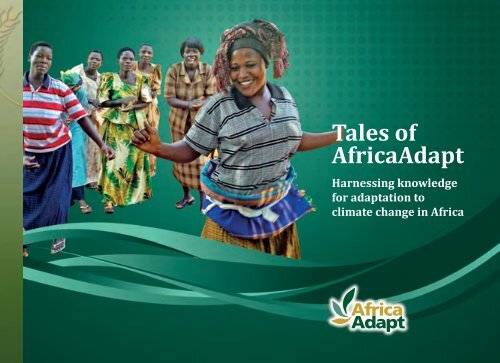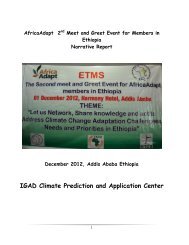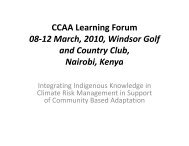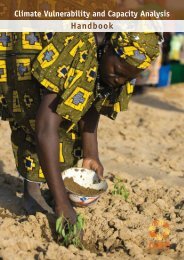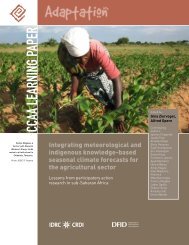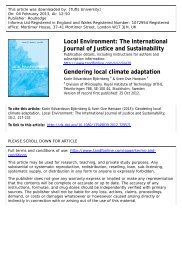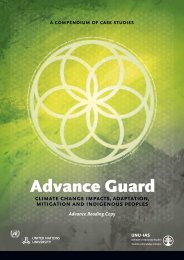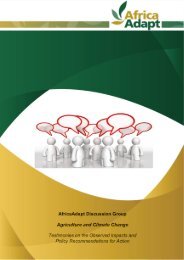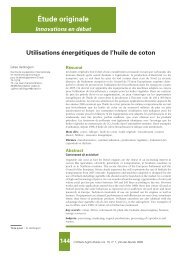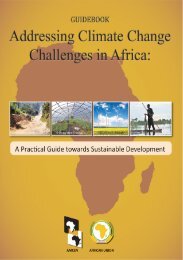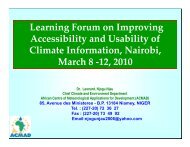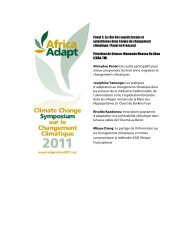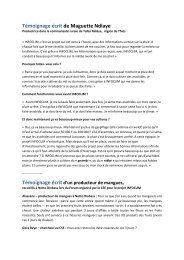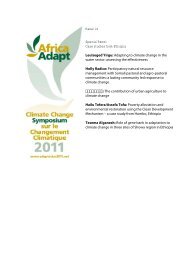Tales of AfricaAdapt
Tales of AfricaAdapt
Tales of AfricaAdapt
- No tags were found...
Create successful ePaper yourself
Turn your PDF publications into a flip-book with our unique Google optimized e-Paper software.
© 2011 by <strong>AfricaAdapt</strong>Citation: <strong>AfricaAdapt</strong>. 2011. <strong>Tales</strong> <strong>of</strong> <strong>AfricaAdapt</strong>: Harnessing knowledge for adaptation to climatechange in Africa. Dakar, Senegal.<strong>AfricaAdapt</strong> encourages fair use <strong>of</strong> this material. Proper citation is requested.For further information, contact:<strong>AfricaAdapt</strong> SecretariatENDA Tiers Monde54, Rue CarnotBP 3370, DakarSenegalEmail: info@africa-adapt.netWebsite: www.africa-adapt.netISBN 978-9988-2-3782-8 ( print)ISBN 978-9988-2-3782-9 ( pdf)Cover and book design: C Venugopal • www.bluepencil.inPrinting: www.pragati.com
Acknowledgements<strong>AfricaAdapt</strong> would not have developed intothe network it is today without the support<strong>of</strong> all its stakeholders. We acknowledge thesupport <strong>of</strong> our funders – the UK Departmentfor International Development (DFID) and theInternational Development Research Centre(IDRC) Climate Change Adaptation in Africaprogramme (CCAA) – for believing in us andinvesting in our vision to share knowledge.We thank the civil-society organisations(community-based organisations [CBOs]and NGOs) that have been an importantlink between the network and our ultimatetarget beneficiaries – the local communities– by taking <strong>AfricaAdapt</strong> to the communitiesand sharing with us the rich communityexperiences.We also thank the researchers who haveshared their work with the network. It hasbeen a partnership <strong>of</strong> mutual support aswe have so gladly helped you to share yourvaluable knowledge and connect with otherstakeholders.To the local communities with whom weengaged either directly or indirectly, weare very grateful to you for sharing yourknowledge and experiences. As much asyou have gained from the network, thenetwork more than benefitted from your richexperiences and knowledge. We especiallythank the communities in Uganda, Ghanaand Senegal who allowed us into their livesand freely shared their innovative adaptationactions.Last but not least, we would not be anetwork had it not been for the foresightand partnership <strong>of</strong> the four managingorganisations: the Institute <strong>of</strong> DevelopmentStudies at the University <strong>of</strong> Sussex (IDS),which led the network through its first phasefrom September 2008 to March 2011, andthe three African partner institutions: ENDATiers Monde, the Forum for AgriculturalResearch in Africa (FARA), and the IGADClimate Prediction and Applications Centre(ICPAC).iv<strong>Tales</strong> <strong>of</strong> <strong>AfricaAdapt</strong>
Building the network<strong>AfricaAdapt</strong> is a knowledge-sharing networkon adaptation to climate change in Africahosted by four partner organisations:• Environment and Development in theThird World (ENDA-TM), based inDakar, Senegal• Forum for Agricultural Research in Africa(FARA), based in Accra, Ghana• IGAD Climate Prediction andApplications Centre (ICPAC), based inNairobi, Kenya• Institute <strong>of</strong> Development Studies (IDS),based in Brighton, UKThe network aims at facilitating the flow <strong>of</strong>knowledge on adaptation to climate changefor sustainable livelihoods among researchers,policy makers, civil-society organisations(CSOs) and communities that are vulnerableto climate variability and change across theAfrican continent.Although <strong>AfricaAdapt</strong> was formally launchedin May 2009, work on establishing thenetwork’s modalities, core partners, andstaffing had been underway for more than2 years prior to its launch. The networkwas funded under a broader programmeon Climate Change Adaptation in Africa(CCAA) through the UK’s Department forInternational Development (DFID) andCanada’s International Development ResearchCentre (IDRC).The CCAA programme was designed topromote African research through the use <strong>of</strong>participatory action and research. <strong>AfricaAdapt</strong>was conceived to work within a similar ethos<strong>of</strong> promoting African knowledge to helpAfrican communities understand and adaptto climatic changes. Early thinking around theestablishment <strong>of</strong> a knowledge-sharing networkwas largely shaped by discussions betweenIDRC and IDS. Both institutions had significantexperience in providing knowledge servicesfor development. An IDRC representative saidthat the initial thinking was:...to create a platform that wouldallow not just CCAA partners,but others engaged in researchand (more broadly) policy makersinvolved in adaptation to climatechange in Africa, to share their ideasand experiences. Simple storiesor knowledge on adaptation toclimate change can be shared withconfidence that such sharing addsvalue to their own personal learning.Meanwhile, from its years <strong>of</strong> working onadaptation to climate change, IDS had1
observed that there was no common platformwhere local communities could exchangetheir knowledge. IDRC and IDS agreedthat for such a network to be sustainable, aminimum number <strong>of</strong> African institutions hadto be involved. They worked on minimumcriteria for partner institutions, such asmandate, potential contribution and capacityto implement. IDS initiated the process byinviting eligible African institutions to presentexpressions <strong>of</strong> interest in joining a knowledgesharingpartnership at a series <strong>of</strong> regionalmeetings around Africa (funded by IDRC).The aim <strong>of</strong> these meetings, according to anIDS staff member who was on the searchcommittee, was ‘to understand and analysethe <strong>of</strong>fer <strong>of</strong> potential partners in relationto establishing a consortium that can beoperational to immediately respond to theclimate change challenge. The partnersshould have the capacity to deliver and haveexperience in working within a consortium.’The initial scoping for partners was held inAddis Ababa in April 2007, where potentialpartners and policy makers engaged withCCAA-supported participatory actionresearchprojects, were assessed on theirknowledge-sharing needs and vision for aknowledge-sharing network. The processgenerated interest from all fronts – research,NGOs, international organisations and CBOs.IDS and IDRC then organised two writeshopsin 2007 – the first in Senegal in Septemberand the second in Ghana in mid-October. Thepurpose was to identify institutions that coulddeliver within a short time frame and sustainthe long-term initiative. Ideas, informationand knowledge were shared by invitedinstitutions. Three African partner instituteswere ultimately selected- ENDA-TM, FARAand ICPAC. Through vibrant online exchangesthe three partners worked together withIDS to develop the final network proposal,which was submitted to IDRC just 2 weeksafter the October writeshop. The proposalwas founded on the belief that knowledgegenerated by research must benefit Africa’smost vulnerable people.In February 2008, the network’s inceptionphase commenced. Roles and responsibilitieswere openly discussed and designated on thebasis <strong>of</strong> the capacities <strong>of</strong> the partners.The network was <strong>of</strong>ficially launchedin May 2009 in Mombasa. To mark theoccasion, the <strong>AfricaAdapt</strong> team met withjournalists from the Kenyan media. Thisinteraction included a media field trip to theworld-famous mangrove plantation at GaziBay, which showcases the impacts <strong>of</strong> sea2 <strong>Tales</strong> <strong>of</strong> <strong>AfricaAdapt</strong>
<strong>AfricaAdapt</strong> inception meeting, Tunis, 2008Press conference at the launch <strong>of</strong> <strong>AfricaAdapt</strong>level rise and erosion along the Kenyan coastline, clearlydemonstrating the need for adaptation to climate change.The <strong>AfricaAdapt</strong> network was thus born.Since its launch, <strong>AfricaAdapt</strong>’s membership and reachhas grown steadily to over 1000 subscribers to its onlineplatform and many more who engage through faceto-facemeetings. The membership is composed <strong>of</strong>researchers, NGOs, CBOs, academia and the media.<strong>AfricaAdapt</strong> breaks barriers to sharing knowledge onadaptation through face-to-face events (‘Meet andGreets’) small grants to support community knowledgesharing (Innovation Fund), printed information products (anetwork newsletter, CD-ROMs and policy briefs like JotoAfrika), an interactive online platform (www.africa-adapt.net), and social media channels like Youtube and Twitter.The falling palm trees at Gazi Bay3
PartnershipsCentral to <strong>AfricaAdapt</strong>’s achievements isits core team <strong>of</strong> partners who manage thenetwork. They operate within a learningenvironment, where decision making andactivity implementation are inclusive andpragmatic. The partner organisations eachfocus on different sectors <strong>of</strong> development– social research, climate science,agriculture, energy and environment – butall have common interest and experience inknowledge management.The key strengths <strong>of</strong> the partnership model:• African ownership. The model is basedon co-ownership <strong>of</strong> the network bypartners, not a sub-contract model.• Dedicated knowledge-sharing <strong>of</strong>ficers(KSOs). These dedicated <strong>of</strong>ficers in eachpartner organisation have been central tothe success <strong>of</strong> <strong>AfricaAdapt</strong>. They are thedrivers <strong>of</strong> the network’s activities.• Decentralised delivery. The physicallocation <strong>of</strong> the partners in 3 African citieshas enabled <strong>AfricaAdapt</strong> to be readilyavailable to facilitate exchange betweenstakeholders.researcher is critical; and at IDS, a researchfellow with strong knowledge-managementskills is important.Implementing this unique model wasnot without its challenges, especially atthe start. However, as the network wasoperationalised, its added value becameclearer and it cemented the host institutions.At FARA, <strong>AfricaAdapt</strong> became the mainplatform on climate change; at ICPAC, itbecame a platform to better communicatewith local communities; and at ENDA, itbecame a useful resource to help stakeholdersbetter understand adaptation.Trust, reinforced by regular face-to-facemeetings and exchange visits between thepartners, has been instrumental in buildingand maintaining a strong team. This wascritical to keeping the partnership togetherduring the handover <strong>of</strong> the lead coordinationrole from IDS to the new lead, ENDA, whichwas selected through a competitive processamong the African partner institutions.The partnership has had its share <strong>of</strong>challenges. As a network hosted withina larger institution, IDS, <strong>AfricaAdapt</strong> hadto rely on existing staff within the hostinstitution. The network has not beenimmune to staff turnover within the shortperiod <strong>of</strong> its existence. Line managers<strong>AfricaAdapt</strong> represented at the Bonn Climate ChangeTalks, 2009institution changed. Continuity <strong>of</strong> the networkactivities was however assured by welldocumentedactivities and processes, regularcommunications and the dynamic core team.Beyond the partner institutions, <strong>AfricaAdapt</strong>gained international recognition due to itsengagement with leading climate changeinitiatives and institutions such as CCAA,the African Ministerial Conference on theEnvironment (AMCEN), community-basedadaptation conferences organised by IIED 1Climate Outlook Forums for the GreaterHorn <strong>of</strong> Africa countries, and the UnitedNational Framework Convention on ClimateChange (UNFCCC).The KSOs were chosen not only for theirability to respond to the network’s demands,but also based on how they could fit into theculture <strong>of</strong> their host institution. In ENDA, theKSO is involved more in general environmentalissues; at FARA, an agricultural background <strong>of</strong> KSOs within partner institutions andis essential; while at ICPAC, having a climate even the lead staff within the coordinating1. International Institute for Environment and Development5
6 <strong>Tales</strong> <strong>of</strong> <strong>AfricaAdapt</strong>
“I have alwaysthought that thesetrees were God-givenso they will continuegrowing just as wejust found them. Butnow I know that wehave to replace thetrees by plantingnew ones.”<strong>Tales</strong> from the communitiesAt the centre <strong>of</strong> <strong>AfricaAdapt</strong>’s goals iscommunity participation in learning andknowledge sharing on adaptation to climatechange at the local level. The followingthree stories from Uganda, Ghana andSenegal highlight the experiences <strong>of</strong> some<strong>of</strong> the beneficiary communities <strong>of</strong> ourKnowledge Sharing Innovation Fund. Thisfund provides grants <strong>of</strong> between USD 6,500and USD 10,000 to CBOs to share adaptationpractices in creative ways. So far, 13 excitingprojects have been supported in marginalisedand hard-to-reach communities across Africa.Learning to cope in UgandaA bumpy dirt road snakes through a woodlotin Jimbo village <strong>of</strong> Lukwanga Parish in WakisoDistrict into Mrs Deizy Zzimbe’s homestead.The unfenced plot is a farmer’s dream: crops,vegetables and livestock each playing a part insecuring food and income for Deizy’s family.Cropping and livestock management are part<strong>of</strong> sustainable agriculture, a concept Deizysays has helped her survive droughts.Scientists have attributed recurrent droughtsto changes in weather patterns as a result<strong>of</strong> climate change. Livelihood activities for amajority <strong>of</strong> communities in Africa are centredon agriculture. For generations, communitieshave known the exact time to begin farming.They knew how much rainfall to expect andprecisely when it would end. Now, withclimate variability, everything has changed.Even the coping strategies that communitiesused to implement to address climate-relatedissues seem no longer to work effectively.With food production threatened, the wholechain <strong>of</strong> livelihood is affected.Before learning and practising sustainableagriculture, Deizy (like her neighbours)earned an easy income from baking bricks.She did not think twice about cutting treesto fire mud bricks, an activity that has led todeforestation in several parts <strong>of</strong> Lukwanga.With a growing demand for bricks, fruit trees,especially the nutritious jackfruit, are being cutdown for firing the bricks. ‘All along I was notaware that if we go on cutting trees for brickbaking we were causing deforestation,’ Deizylaments. ‘I have always thought that thesetrees were God-given so they will continuegrowing just as we just found them. But nowI know that we have to replace the trees byplanting new ones.’Deizy is a member <strong>of</strong> the LukwangaCommunity Knowledge Centre, located in theheart <strong>of</strong> Lukwanga district. The centre wasfunded by the Innovation Fund established to7
The endangered jackfruit tree (Artocarpus heterophyllus)support solutions to sharing information onadapting to the impacts <strong>of</strong> climate change.‘Thanks to the opening <strong>of</strong> this centre, I amnow aware about deforestation and its linkto climate change,’ Deizy explains. ‘I haveseen on television how people are sufferingbecause <strong>of</strong> deforestation. It is time forwomen to fight this enemy because hunger issweeping across the village and malnutritionis affecting our children. We have cut thejackfruit trees and others which providednutrients for us and our children.’Weekly meetings convened at the knowledgecentre are a platform for Deizy and herneighbours to share information about climate8 <strong>Tales</strong> <strong>of</strong> <strong>AfricaAdapt</strong>change and howthey can spreadknowledge onstrategies to adaptto changes. Climatechange has affectedthe way people live,eat and raise extraincome. Deizy’shomestead hasmore than 50 treesthat she plantedto provide fruitsand shade for hervegetables and yams.Walking up to herhomestead, elephant grass is neatly plantedaround terraces to hold the soil and serveas fodder for goats that are kept in pens toprevent them from eating the seedlings andshoots. Goat manure is collected for thegarden and the field each planting season.‘Even though it has been a drought year, wehave been getting enough food for our familyby practising sustainable agriculture whichteaches the proper management <strong>of</strong> manure,water and the soil,’ says Deizy.Farmers like Deizy work with little, if any,resources to improve their productivity. Withmore information on better farming practicesand strategies to adapt to the impact <strong>of</strong>climate change, farmers can live <strong>of</strong>f what theyproduce and have extra to sell.Yet access to improved farming methods andknowledge remains a drawback for manysmallholder African farmers who lag behindtheir counterparts in Asia in terms <strong>of</strong> theamount <strong>of</strong> fertilizer they use per hectare.African governments have committed tospending at least 10 percent <strong>of</strong> nationalbudgets on agricultural investment, but fewhave reached this threshold.Apart from the challenges with inputs – eventhough researchers are working on resilientLukwanga field visit—Deizy with yam
Improved farming techniques help increase maize yield <strong>of</strong> this farmer in Lukwanga9
Above and below: Drama and song is used to spread the message on climate changeseeds suited to harsh conditions – farmers in Africa have poor accessto produce markets owing to the generally weak communicationsinfrastructure. Agricultural productivity will increase if it is matched byincreased investment in agricultural research and development to helpmore farmers like Deizy to apply innovations on their farms.Evaristo Ndugga, the coordinator <strong>of</strong> the Lukwanga CommunityKnowledge Centre, says that the centre has raised the awarenessabout the impact <strong>of</strong> climate change in the district using a variety <strong>of</strong>methods. Reading material complements the use <strong>of</strong> songs and drama todisseminate information on climate change.A local NGO helped the community design a colour poster explainingthe impact <strong>of</strong> climate change and suggesting ways <strong>of</strong> responding toit. Translated into the local language, the poster is used as a teachingand learning aid. It vividly describes how cutting down fruit trees forbrick baking is a source <strong>of</strong> poverty and hunger in the community. Theposter draws a picture <strong>of</strong> hope that planting <strong>of</strong> trees can provide fruit,land cover and a greener environment through collective communityaction.Members <strong>of</strong> the Lukwanga Community Knowledge Centre have evenlearnt how to make charcoal from banana peels and sawdust, thus savingtrees from being cut for fuel.Drama and song, performed in the local language – Luganda – hasproved a popular and effective means <strong>of</strong> sharing information onadaptation strategies with the local community. Farouq Ssessanga, forexample, a youth representative at the knowledge centre, participatesin the local drama group and has taken the lead in planting fruit trees inhis garden thanks to tips shared during drama sessions.The chairman <strong>of</strong> the drama group, Aaron Ndyanabo, explains thatdrama has portrayed deforestation and the negative impacts <strong>of</strong> brickbaking to help influence some changes in the community: ‘Our grouphas played a big part in raising awareness about climate change in our10 <strong>Tales</strong> <strong>of</strong> <strong>AfricaAdapt</strong>
community. We see the change in peoplebeing able to show two or three trees theyhave planted indicating they have receivedsome knowledge about the impact <strong>of</strong> climatechange.’Tuning in Radio JOKKO,SenegalIn the town <strong>of</strong> Rufisque, Senegal, localcommunity radio stations are raisingawareness on climate change throughinteractive broadcasts to local communities.The project, funded by <strong>AfricaAdapt</strong>,supported the training <strong>of</strong> radio journaliststo broadcast programmes on adaptationto climate change. These programmes arebroadcast in Wol<strong>of</strong>, the local language.JOKKO is a community radio established in2003. It has a 79-percent share <strong>of</strong> the radioaudience in the administrative division <strong>of</strong>Rufisque, which has a population <strong>of</strong> 500,000people. Radio JOKKO has signed agreementswith rural districts and communities to involvethem in its programmes and services. It ishelping to raise awareness on climate changeissues, particularly coastal erosion, whichhas caused damage in Rufisque, a fishingcommunity.‘We received via the internet a call fornominations launched by <strong>AfricaAdapt</strong> andwe told ourselves it was an opportunity tocarry out awareness and knowledge sharingactivities on the problem <strong>of</strong> coastal erosion,’says Ahmed Bâ, Programme Coordinator <strong>of</strong>Radio JOKKO. ‘We applied and <strong>AfricaAdapt</strong>financed our project to create Clubs RadioCitoyens (Citizens’ radio clubs, CRC) tostrengthen citizen voices through the JOKKOcommunity radio.’Each CRC is made up <strong>of</strong> 25 people and RadioJOKKO has produced radio programmes onclimate change in the two districts <strong>of</strong> Rufisque– Diokoul in the west and Thiawléne in theeast. These clubs aim to increase awareness<strong>of</strong> the causes and consequences <strong>of</strong> coastalerosion among populations in Rufisque, andexamine solutions. The programmes arerecorded by the seaside with the participation<strong>of</strong> all people in the community. With<strong>AfricaAdapt</strong>’s assistance, radio programmeswere produced and broadcast daily over a3-month period in Rufisque and its outskirtsto highlight the negative impacts <strong>of</strong> climatechange.The dyke built to protect against flooding, SenegalMembers <strong>of</strong> Club Radio Citoyen (CRC)11
‘Mosques, markets, even cemeteries werecarried away by the sea,’ says Saliou Bâ<strong>of</strong> the Thiawléne CRC. ‘Radio JOKKOprogrammes increased people’s awareness<strong>of</strong> the problem and, as a result, people havestopped collecting sea sand, a practice thatwas aggravating the problem. A sea wall wasbuilt 20 years ago, but it had started to sink.Following the awareness programmes, thecommunities started to strengthen the wall,but large-scale actions are also needed.’Journalist and CRC presenter Pouye Moussasaid that because 99 percent <strong>of</strong> Thiawléne’sinhabitants fish for a living, climate changehas heightened the scarcity <strong>of</strong> fish in additionto coastal erosion. People have died whileThe sea wall built by the community in Senegalfishing in high seas because fish are no longeravailable close to shore.Aliou Sy, a member <strong>of</strong> the Thiawléne CRC,and his family have been living in Rufisque since1904. He said there used to be a forest wherethe sea is today. An area previously known asArafat has been swallowed by the sea. About50 years ago almost 200 houses were carriedaway by the sea and families had to move.‘If nothing is done, we will meet the samefate,’ Sy warns. ‘We were told that theproblem was caused by climate change, butI think it was worsened by the refilling workthat was carried out at the port <strong>of</strong> Dakar in1984. As a result, the sea water that shouldhave been around the port is at our place.’A municipal councillor and member <strong>of</strong> theCRC, Adama Diop Absa says that every yearthe sea encroaches onto land, damagingbuildings, causing flooding and spreadingdiseases. ‘We were told by radio JOKKOjournalists that it was due to climate change.Elevating the house floors with sea sand asprotection is not a sustainable solution. Thepeople have gathered to initiate projects t<strong>of</strong>ight this phenomenon.’Madame Andama Diop Absa, Municipal Councillorand member <strong>of</strong> CRC12 <strong>Tales</strong> <strong>of</strong> <strong>AfricaAdapt</strong>
Adapting in GhanaA local NGO, People’s Dialogue on HumanSettlements (PDHS), has coordinatedtwo awareness-raising projects funded by<strong>AfricaAdapt</strong> for communities in Ghana. One<strong>of</strong> the communities is Old Fadama, the largestsquatter settlement in the country. The otheris New Takoradi, a fishing community <strong>of</strong>about 40,000 people in western Ghana. PDHSfacilitates the provision <strong>of</strong> secure and decenthousing for the urban poor, particularly slumdwellers.PDHS has used the <strong>AfricaAdapt</strong> website toaccess information on climate change andcompile a manual for training peer educatorsin Old Fadama. Programme Coordinator,Mensah Owusu, says that the urban poor arethe worst affected by the impacts <strong>of</strong> climatechange. He believes that most <strong>of</strong> the activities<strong>of</strong> slum communities are climate dependentbecause they occupy marginal lands whereliving conditions are deplorable. Owusu saysthat the capacity <strong>of</strong> marginalised communitiesto adapt to climate change is lower than that<strong>of</strong> other groups <strong>of</strong> people. In Old Fadama,the People’s Dialogue works to highlight thelack <strong>of</strong> basic services, especially shelter andsanitation. Sanitation is <strong>of</strong> major concern inOld Fadama because people have no refusecollection facilities and are forced to dumpwaste indiscriminately.In New Takoradi, PDHS has createdawareness in the community about the causesand impacts <strong>of</strong> sea erosion and rising sealevels. Prior to the project, some people inthe town attributed dwindling fish stocks tosuperstition. After discussions and trainingsessions, they now appreciate that some <strong>of</strong>their practices – such as polluting the water,using dynamite to kill the fish and using smallnets – have contributed to the problem.‘Dubars’ (community gatherings) have beeninstrumental in the sharing <strong>of</strong> knowledge <strong>of</strong>the impact <strong>of</strong> climate change in these twoslum communities in Ghana. The gatheringsfacilitate the exchange <strong>of</strong> information betweenCSOs and communities. People have alsolearnt by doing.‘Communities are not empty vessels,’ saysOwusu. ‘There is a lot <strong>of</strong> information in thecommunity that can be gathered and used.We have used a dubar to learn from them andthem from us.’Exchange visits between the communities<strong>of</strong> Old Fadama and New Takoradi havehelped the two groups learn from eachother about best practices. In Old Fadama,the communities worked together toestablish savings clubs, which meet weekly todiscuss solutions to challenges faced by thecommunity. While promoting the culture <strong>of</strong>saving small amounts <strong>of</strong> money on a daily andHousing and sanitation conditions in Old Fadamaweekly basis, the savings clubs also provide aforum for mobilising the community.The communities testified that informationsharing has led to behavioural changes interms <strong>of</strong> environmental management. HarunaAbu, and <strong>of</strong>ficer with the Ghana Federation13
<strong>of</strong> the Urban Poor, says that information onclimate change has triggered new awarenesson the need for good sanitation in OldFadama where communities have initiatednew, environmentally friendly ways <strong>of</strong> wastedisposal.A sanitation task force has also been revivedin each zone within the slum.Members <strong>of</strong> the savings group in Old Fadama‘At the community level there has been somechange in behaviour,’ Owusu says, ‘but it willtake months to achieve lasting behaviouralchange, so we are looking forward toan opportunity to build on what we haveachieved.’Stringing the stories togetherThese three stories show how, with limitedfinancial resources, vulnerable communitiescan be empowered to develop and applyinnovative solutions to improve theirlivelihoods.14 <strong>Tales</strong> <strong>of</strong> <strong>AfricaAdapt</strong>
Lessons learntAfter two years <strong>of</strong> implementation, the keylearning points to emerge from the networkare threefold.a. African researchers and members <strong>of</strong>community organisations are much morecomfortable sharing knowledge <strong>of</strong>flinethan online. More <strong>of</strong>fline opportunitiessuch as knowledge fairs need to becreated, recognising that while onlinemodes are supportive and important,they should be treated as the juniorpartner.b. The balance <strong>of</strong> effort should be less onbuilding the technical skills <strong>of</strong> peopleto communicate their knowledge, andmore on emphasising the creation <strong>of</strong>opportunities for effective sharing andexchange between interest groupsand promoting the value <strong>of</strong> knowledgesharing as an approach.c. The ongoing delivery <strong>of</strong> a knowledgesharing network is considerably differentfrom more traditional project- orprogramme-based work – anticipatedoutcomes are difficult to predict andmeasure and activities required to reachthem are evolving, opportunistic andexperimental.Below: Workshop participants discuss with a farmer. Above: Using a donkey to facilitate knowledge sharing15
Moving forwardA recurrent question facing the partnershipis ‘What can we do better to meetthe knowledge needs <strong>of</strong> vulnerablecommunities in Africa?’ Here are a fewideas that have emerged from the network.• Complement awareness-raisingon climate change by supportingcommunity-led adaptation action throughdissemination <strong>of</strong> successful adaptationtechnologies and practices.Community radio broadcaster• Facilitate greater interaction andknowledge sharing between localcommunities.• The network needs to increase theopportunities for interaction betweenmembers – both virtually and face-to-face– across disciplines and communities.• Expand the use <strong>of</strong> multimedia to reacha greater number <strong>of</strong> communities, forexample through interactive communityradio broadcasts.2011 and beyondAs <strong>of</strong> 1 June 2011, <strong>AfricaAdapt</strong> will be a fullyAfrican-led network with ENDA as the leadpartner with strong support from FARAand ICPAC. Although many <strong>of</strong> the idealsand objectives <strong>of</strong> network will remain, thenetwork will increasingly focus on enhancingresilience and reducing vulnerability to thenegative impacts <strong>of</strong> climate change. It will doso through better facilitation <strong>of</strong> knowledgesharing and increasingly active involvement inconnecting stakeholders. This will strengthenthe culture <strong>of</strong> knowledge sharing withinAfrican institutions by raising the pr<strong>of</strong>ile <strong>of</strong>African knowledge and research.As a learning network, <strong>AfricaAdapt</strong> willcontinue to be open and inclusive, butwill be selective in its engagements. It willbe more outcome-focused, emphasisingknowledge sharing for action while increasinggeographical and thematic coverage. Thecurrent online platform will support moreactive member-to-member interaction.However, there will also be an increased focuson <strong>of</strong>fline activities, with <strong>AfricaAdapt</strong> devotinga higher proportion <strong>of</strong> resources to face-t<strong>of</strong>aceinteraction <strong>of</strong> stakeholders in differenttypes and scales <strong>of</strong> events from informal ‘meetand greets’ to knowledge fairs.16 <strong>Tales</strong> <strong>of</strong> <strong>AfricaAdapt</strong>
• A hub for stimulating innovation in both<strong>of</strong>fline and online knowledge-sharingpractices through the Knowledge SharingInnovation Fund and experimentationwith Web 2.0 tools.• A key broker in knowledge sharingamong researchers, policy anddecision makers, CBOs and vulnerablecommunities through face-to-facemeetings, alliances with community radionetworks, and sharing <strong>of</strong> cases whereimproved knowledge access has enabledadaptation.• A strong voice for the African adaptationknowledgedomain in the increasinglycrowded international adaptationinformation industry.Participants at the <strong>AfricaAdapt</strong> "Meet and greet" in Addis Ababa, 2010It is envisaged that during phase 2, <strong>AfricaAdapt</strong>will become established as the principalknowledge-sharing network for Africa. In thissecond phase, the network will become:• A research and learning pole on ‘whatworks’ in knowledge-sharing practices inAfrica, led and managed by dynamic andpragmatic African organisations. It willbe an eminent convenor <strong>of</strong> English andFrench adaptation-knowledge-sharingevents.• A leading provider <strong>of</strong> African adaptationresearch and local knowledge to Africanpolicy makers, through its onlineresources and platforms and othercommunication tools.The <strong>AfricaAdapt</strong> network has contributedto the increased awareness and interest inadaptation issues among different playersand stakeholders in Africa. The diverse andfragmented pockets <strong>of</strong> knowledge and thelow capacity for communicating knowledgeremain a challenge, but with the benefit<strong>of</strong> hindsight <strong>AfricaAdapt</strong> is well placed tocontinue in its quest to overcome barriersto knowledge sharing around climate changeadaptation on the continent.17
The faces <strong>of</strong> the <strong>AfricaAdapt</strong> core teamZachary Atheru2007-2010IGAD Climate Prediction andApplication CentreNairobi, Kenyazatheru@icpac.netDady Demby2007–2009RAILS Programme OfficerForum for Agricultural Research in AfricaAccra, Ghanaddemby@fara-africa.orgBinetou Diagne2009 to presentKnowledge Sharing OfficerENDA Tiers MondeDakar, Senegalbinetou.diagne@gmail.com18 <strong>Tales</strong> <strong>of</strong> <strong>AfricaAdapt</strong>
Nicolas Drunet2010 to present<strong>AfricaAdapt</strong> Program Manager phase 2ENDA-Tiers MondeDakar, Senegalenda.nicolas.drunet@gmail.comMaggie Ibrahim2008–2009Institute <strong>of</strong> Development StudiesUniversity <strong>of</strong> SussexBrighton, UKLawrence Flint2009–2010<strong>AfricaAdapt</strong> Program Manager phase 2ENDA-Tiers MondeDakar, SenegalTom Mitchell2007–2009<strong>AfricaAdapt</strong> Program Manager (phase 1)Institute <strong>of</strong> Development StudiesUniversity <strong>of</strong> SussexBrighton, UKBlane Harvey2008 to presentKnowledge Sharing OfficerInstitute <strong>of</strong> Development StudiesUniversity <strong>of</strong> SussexBrighton, UKb.harvey@ids.ac.ukMamouda Moussa Na Abou2007 to present<strong>AfricaAdapt</strong> Network CoordinatorENDA Tiers MondeDakar, Senegalmamoudam@gmail.com19
Jacqueline Nnam2009 to presentKnowledge Sharing OfficerForum for Agricultural Research in AfricaAccra, Ghanajnnam@fara-africa.orgGilbert Ouma2009 to presentIGAD Climate Prediction and Application CentreNairobi, Kenyagouma@icpac.netEmmanuel Seck2007-2009ENDADakar, SenegalAbebe Tadege2009 to presentKnowledge Sharing OfficerIGAD Climate Prediction and ApplicationCentre (ICPAC)Nairobi, Kenyaatadege@icpac.netMyra Wopereis-Pura2007 to presentDirector, Access to Knowledge andTechnologiesForum for Agricultural Research in AfricaAccra, Ghanamwopereispura@fara-africa.orgFrançois Stepman2007–2009Communications and PublicAwareness SpecialistForum for Agricultural Research in AfricaAccra, Ghana20 <strong>Tales</strong> <strong>of</strong> <strong>AfricaAdapt</strong>
About <strong>AfricaAdapt</strong><strong>AfricaAdapt</strong> is an independent bilingual network (French/English)focused exclusively on Africa. The network’s aim is to facilitate theflow <strong>of</strong> climate change adaptation knowledge for sustainable livelihoodsbetween researchers, policy makers, civil society organisations andcommunities who are vulnerable to climate variability and changeacross the continent.How does <strong>AfricaAdapt</strong> work?Our activities use the latest web-based applications, face-to-faceinteractions, and other media for: sharing resources; facilitatinglearning; and strengthening the African adaptation community. Ouronline activities are complemented by a range <strong>of</strong> <strong>of</strong>fline activities andservices, including:• An innovation fund <strong>of</strong>fering small grants for new approaches toknowledge sharing• Face-to-face meetings bringing people together to exchange ideasand overcome challenges• A CD-ROM and paper-based dissemination service for networknews and resourcesOur partners<strong>AfricaAdapt</strong> is collaboratively hosted by four organisations:Environment and Development in the Third World (ENDA-TM), Forumfor Agricultural Research in Africa (FARA), IGAD Climate Prediction andApplications Centre (ICPAC), and Institute <strong>of</strong> Development Studies (IDS).ENDA-TM works to improve the tools <strong>of</strong> knowledge for initiativeslinked to the environment and local development contributing tothe search for alternative development possibilities. It is active in 21countries and based in Dakar, Senegal. Its approach is to work in closepartnership with community-based organisations and communitymovements. ENDA’s Energy Programme focuses on access to energyand climate change.FARA is an umbrella organization bringing together and formingcoalitions <strong>of</strong> major stakeholders in agricultural research anddevelopment in Africa. It complements the activities <strong>of</strong> African national,international and sub-regional research institutions to promoteagricultural innovation. It aims to reduce poverty in Africa throughsustainable broad-based agricultural growth and improved livelihoods,particularly <strong>of</strong> smallholder and pastoral enterprises.ICPAC enables East African countries to cope better with risksassociated with extreme climate variability and change through theprovision <strong>of</strong> climate early warning information. It supports specificsectors to contribute to poverty alleviation efforts, environmentalmanagement and sustainable development, improving systems to shareclimate information and expands the climate knowledge-base to enableappropriate responses.IDS is a global organisation for research, teaching and communicationson international development. It maintains programmes <strong>of</strong>multidisciplinary research programmes, research and action networksand consortia and hosts a number <strong>of</strong> knowledge services. Its growingteam <strong>of</strong> experts on climate change works closely with a strong network<strong>of</strong> partners in developing countries to pioneer research and knowledgepartnerships for development in a changing climate.The network is jointly funded by the UK Department for InternationalDevelopment (DFID) and the International Development ResearchCentre (IDRC) Climate Change Adaptation in Africa Programme.
About <strong>AfricaAdapt</strong><strong>AfricaAdapt</strong> is an independent bilingual network(French/English) focused exclusively on Africa.The Network’s aim is to facilitate the flow<strong>of</strong> climate change adaptation knowledge forsustainable livelihoods between researchers,policy makers, civil society organisations andcommunities who are vulnerable to climatevariability and change across the continent.<strong>AfricaAdapt</strong> is hosted by Environment andDevelopment in the Third World (ENDA-TM),Forum for Agricultural Research in Africa (FARA),IGAD Climate Prediction and Applications Center(ICPAC) and the Institute <strong>of</strong> Development Studies,University <strong>of</strong> Sussex. The Network is fundedthrough the UK Department for InternationalDevelopment (DFID) and the InternationalDevelopment Research Centre (IDRC) ClimateChange Adaptation in Africa Programme.<strong>AfricaAdapt</strong> SecretariatENDA Tiers Monde, 54, Rue CarnotBP 3370, Dakar, Senegalinfo@africa-adapt.netwww.africa-adapt.net


